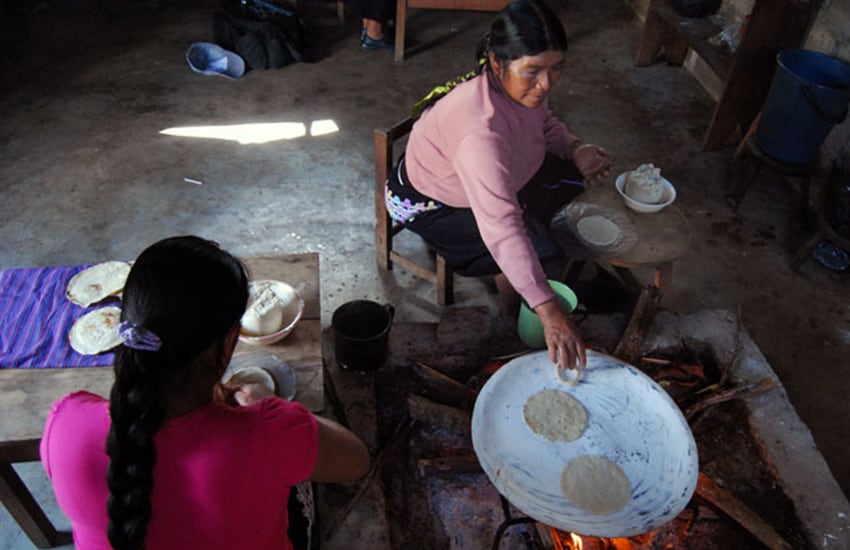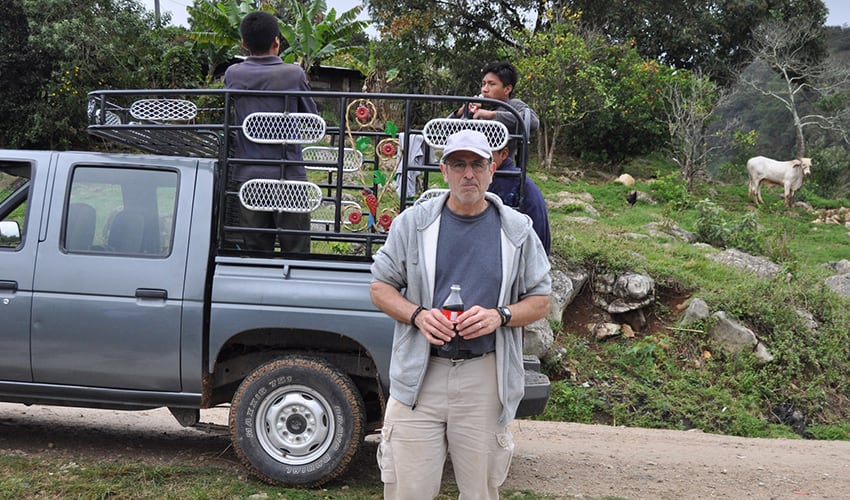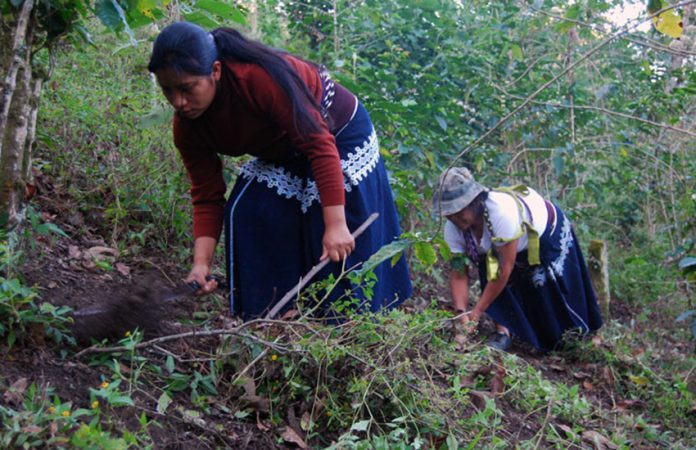On my second trip to Amaquil, a tiny, remote pueblo in one of the coffee-growing regions in Chiapas, I was staying with Nicolás and Catarina and their family, photographing what daily life was like for coffee growers. I had no idea what the day had in store for me.
One day I went with Nicolás’ sister Lucia and her parents to photograph them as they cleared a field of weeds. This is done by hacking at them with a machete.
It’s hard work, especially under a hot sun. I noticed that Lucia was chewing on something that looked like a piece of a stalk and figured it was caña — sugar cane. When I asked her if it was, sure enough, I was right and she asked if I wanted some. Being the adventurous type, I said yes.
She handed me a piece, and I bit into it. Before I could even think about taking a second, my heart rate soared.
My heart wasn’t just beating rapidly, it was pounding. I looked down and saw that it was pounding so hard that my shirt was moving.

At the time, I had some sort of heart condition where my heart rate would suddenly increase periodically; I think it’s called tachycardia. So, being familiar with it, I didn’t panic. Yet.
But the beating was stronger and faster than I’d ever experienced, and I wasn’t in the United States. I was in a small, remote pueblo, and if this got to the point where I needed a hospital, I had no idea where the nearest one was — if there even was a nearest one. Which I doubted.
Now, I’m the kind of guy whose approach to medical issues is fairly basic: I ignore them.
I figure they’ll either get better, in which case I’ll be fine and I saved myself some time and money by ignoring them, or they’ll get worse, in which case I may actually have to do something. Which I usually don’t.
I’m not saying this is the most intelligent approach, but it’s worked for me so far. When tachycardia (or whatever it’s called) episodes happened back in the U.S., I’d just wait it out, and it eventually stopped. Sometimes it took 15 or 20 minutes, sometimes even longer, but it always stopped. I figured the same thing would happen here.
I continued photographing, but my attention got pulled more and more toward my pounding heart. Mostly I was curious about what had triggered it, but I was also getting a little concerned at the intensity.
Lucia eventually told me that she and her parents were finished for the day and that they were going to walk to their home. Did I want to come along? We headed off, my heart pounding and sweat pouring off me.
At some point in the walk, my legs started to feel weak and I had to slow down. The trio ahead of me turned off the road, onto a path through some woods. It was a very short, easy path with only a slight incline at one point, but my legs had no strength in them. I finally grabbed onto some tree branches and hauled myself up. Lucia and her parents waited for me at the path’s end. They looked concerned; I’m sure I looked panicked. My Spanish was still pretty basic back then, but I tried to explain the problem.
“It’s my heart,” I said.
“We are accustomed,” Lucia replied, meaning that they were accustomed to the heat and the humidity and the walking and I wasn’t.
“No, no,” I said, panting. “It is my heart. I have a problem.”
I was at a loss for words. What the heck is Spanish for tachycardia anyway? So I said again, “It is my heart.” Fumbling for words, I said, “Boom, boom, boom.”

Lucia looked at me with a blank expression. “We are accustomed,” was all she said before turning and walking away.
I leaned against a tree for a few minutes, completely convinced that this was where I’d learn what awaited me after life ended. As curious as I’ll admit to being about that, I wasn’t anxious to find out at that particular moment. I wanted more time to prepare. In fact, what I really wanted was several more years.
I finally let go of the tree and made my way slowly across the road to the parents’ home, where Lucia was talking with someone.
“Everyone from the village is gone,” she said. “There are no cars. We cannot take you to the city.”
“I’ll be fine,” I managed to get out. “I just need to rest.”
“We are accustomed.”
I really wished she would stop saying that.
I walked into the yard and sat, my heart still pounding and sweat still pouring down my face. My heart rate was still well over 100 beats per minute and pounding and it had been over an hour.
Lucia said she had to go to another village. Did I want to go with her? I decided I would, figuring that walking might lower my heart rate. I have no idea why I thought that, but I was at a loss.
The road was hard-packed dirt, and once again, there was a very slight incline, but this one went on for some distance. I was lagging behind Lucia when I realized that I couldn’t continue. There was absolutely no strength in my legs, and I found myself bent over, panting.
I called to her, telling her I couldn’t continue. We went back to her parents’ house.
I studied biology, and I remember enough about biochemical pathways to know that every pathway has a feedback mechanism. If the end product of a pathway is, say, sugar, then when at an excessive amount of sugar, the feedback mechanism will slow or stop its production.
I knew that sugar and caffeine can increase a person’s heart rate. I also knew that Coke has a lot of sugar and caffeine, and I reasoned that if I drank one, maybe it could slow down my heart rate. (I’m sure a lot of doctors and biologists are cringing right now, but my options were fairly limited.)
So I bought a Coke and guzzled it down. It worked. I don’t know if it was causational, correlational or the placebo effect, and I couldn’t care less why my heart rate dropped. All I know is that I was grateful it did.
I told Lucia I felt better and that we could continue on to the other village. We walked down the road, and I got up that incline with no trouble. Even though I was confused at what had happened to me, I smiled, thinking how good it felt to be alive.
Joseph Sorrentino, a writer, photographer and author of the book San Gregorio Atlapulco: Cosmvisiones and of Stinky Island Tales: Some Stories from an Italian-American Childhood, is a regular contributor to Mexico News Daily. More examples of his photographs and links to other articles may be found at www.sorrentinophotography.com He currently lives in Chipilo, Puebla.
